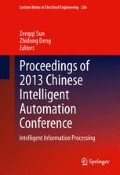Abstract
Among the variants of GP, GEP stands out for its simplicity of encoding method and MEP catches our attention for its multi-expression capability. In this paper, a novel GP variant-MGEP (Multi-expression based Gene Expression Programming) is proposed to combine these two approaches. The new method preserves the GEP structure, however unlike the traditional GEP, its genes, like those of MEP, can be disassembled into many expressions. Therefore in MGEP, the traditional GEP gene can contain multiple solutions for a problem. The experimental result shows the MGEP is more effective than the traditional GEP and MEP in solving problems.
Access this chapter
Tax calculation will be finalised at checkout
Purchases are for personal use only
References
Oltean M, Grosan C (2004) Evolving digital circuits using multi- expression programming. In: Proceedings of NASA/DoD conference on evolvable hardware. IEEE Press, pp 87–94
Oltean M, Grosan C, Diosan L, Mihaila C (2008) Genetic programming with linear representation a survey, WSPC/INSTRUCTION FILE
O’Nell M, Vanneschi L, Gustafson S, Banzhaf W (2010) Open issues in genetic programming. Genet Program Evolvable Mach 11:339–363
Oltean M, Grosan C (2003) A comparison of several linear genetic programming techniques. Complex Syst 14:285–313
He P, Kang L, Johnson CG, Ying S (2011) Hoare logic-based genetic programming. Sci Ch Inf Sci 54(3):623–637
Ferreira C (2002) Gene expression programming, 1st edn. Angra do Heroismo, Portugal
Ferreira C (2004) Gene expression programming and the evolution of computer programs. In: de Castro LN, Von Zuben FJ (eds) Recent developments in biologically inspired computing, vol 5. Idea Group Publishing, New York, pp 82–103
He P, Johnson CG, Wang HF (2011) Modeling grammatical evolution by automaton. Sci Ch Inf Sci 54(12):2544–2553
Karakasis VK, Stafylopatis A (2006) Data mining based on gene expression programming and clonal selection. IEEE congress on evolutionary computation, Vancouver, Canada, pp 514–521
Tsakonas A (2006) A comparision of classification accuracy of four genetic programming-evolved intelligent structures. Inf Sci 176:691–724
Cattani PT, Johnson CG (2010) ME-CGP: multi expression cartesian genetic programming. IEEE Congr Evolut Comput 2010:1–6
Yanan W, Bo Y, Zhao X (2009) Countour registration based on multi-expression programming and the improved ICP. IEEE, 2009
Chen Y, Jia G, Xiu L (2008) Design of flexible neural trees using multi expression programming. In: Proceedings of Chinese control and decision conference, vol 1, pp 1429–1434
Acknowledgments
This work was supported by the National Natural Science Foundation of China (Grant No. 61170199), Hunan Provincial Innovation Foundation for Postgraduate (CX2012B367), Guangxi Key Laboratory of Trusted Software (Guilin University of Electronic Technology), and the Scientific Research Fund of Education Department of Hunan Province, China (Grant No. 11A004).
Author information
Authors and Affiliations
Corresponding author
Editor information
Editors and Affiliations
Rights and permissions
Copyright information
© 2013 Springer-Verlag Berlin Heidelberg
About this paper
Cite this paper
Deng, W., He, P., Huang, Z. (2013). Multi-Expression Based Gene Expression Programming. In: Sun, Z., Deng, Z. (eds) Proceedings of 2013 Chinese Intelligent Automation Conference. Lecture Notes in Electrical Engineering, vol 256. Springer, Berlin, Heidelberg. https://doi.org/10.1007/978-3-642-38466-0_49
Download citation
DOI: https://doi.org/10.1007/978-3-642-38466-0_49
Published:
Publisher Name: Springer, Berlin, Heidelberg
Print ISBN: 978-3-642-38465-3
Online ISBN: 978-3-642-38466-0
eBook Packages: EngineeringEngineering (R0)

